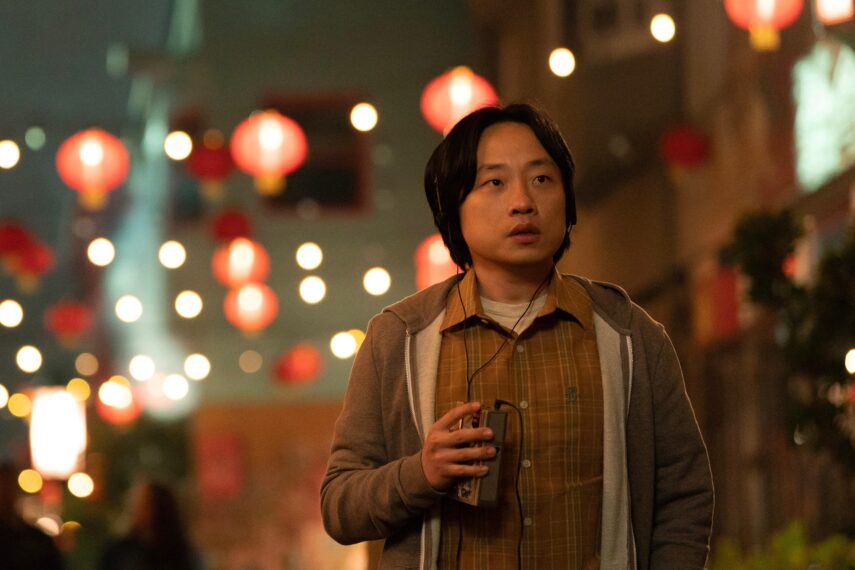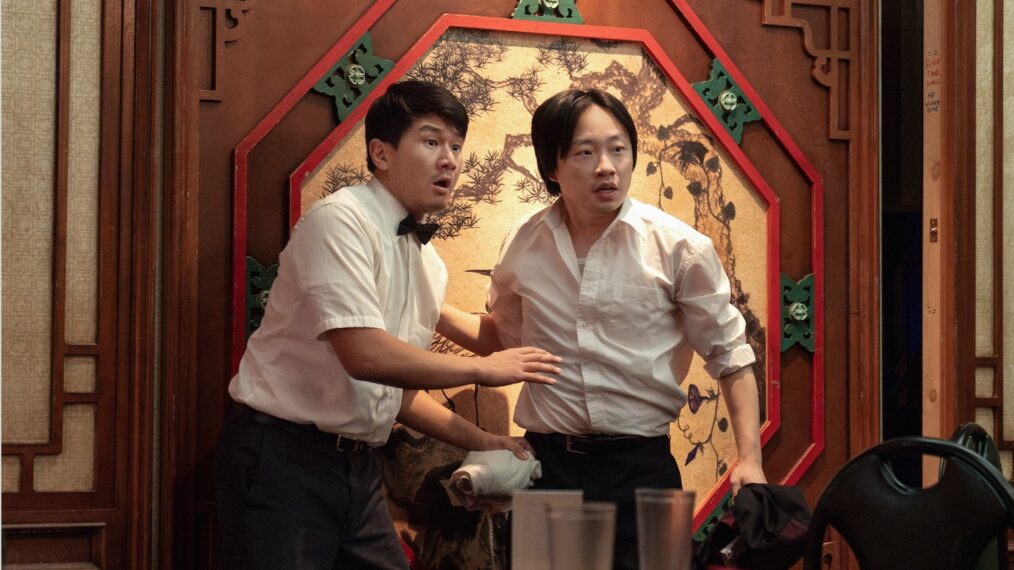In Hulu‘s Interior Chinatown, we meet Willis Wu (played expertly by Silicon Valley’s Jimmy O. Yang). And Willis… he’s stuck. A waiter at the Golden Palace and a background character in police procedural Black & White, Willis tends to his elderly parents and practices kung fu between shifts, while dreaming of being a hero like the TV cops he idolizes, cool Miles Turner (Sullivan Jones, The Gilded Age) and smart Sarah Green (Jury Duty‘s Lisa Gilroy). He gets his chance after witnessing an abduction and helping glamorous detective Lana Lee (Chloe Bennet, Marvel’s Agents of S.H.I.E.L.D.) investigate a Chinatown mystery that might also relate to Willis’ long-missing older brother. Suddenly, he’s a lead on Black & White and his life is turned upside down.
“It’s like the world’s strangest cop show that at its heart is a [show about family],” says series creator Charles Yu (Westworld), who penned the 2020 National Book Award winner the series is based on. Yu calls the series “Law & Order meets The Twilight Zone meets The Truman Show.”
Below, Yu dissects his meta, tone-breaking 10-episode romp.
A lot of the book is formatted like it’s a script, but it’s still hard to visualize this as an onscreen story. What would you say was the biggest hurdle for you in adapting your novel for TV?
Charles Yu: Yeah, I think you just said it. The biggest challenge was translating the idea of the book, which is represented as a script, [and] the script represents Willis, the story he wants to get into. It visually and conceptually gives the reader that idea, what that looks like in the show, and I won’t spoil it, but it’s pretty evident early on, is that we’re basically having to do that by showing you all the tropes and fun pieces of a cop show. So, you get the feeling of this world around Willis, that he’s really at the edges of. So we do that with where the camera is put, how it’s shot, and with color even. There are so many departments that had to contribute to delineating the world of the show and then Willis being on the outside of that world.
The show is surprisingly hilarious. Obviously, with a comic as the star, it’s going to be funny, but Yang also shows great range in the emotional scenes, too. How would you describe his Willis Wu and how he might differ from the book version?
Jimmy brought layers of his own personal experience, and he is funnier than book Willis, for sure. I think that was always the idea — cast the hilarious comedic actor and let them stretch to be dramatic. I think Jimmy’s Willis has probably more swagger than book Willis as well, which I’ve always loved about Jimmy as a performer, is that there’s this really surprising inner confidence that you can feel, even in [Silicon Valley’s] Jin Yang, you know, maybe especially in Jin Yang. He’s just so talented.
And to go to your question on tone and humor, I did want it to sneak up on people, I felt like with Taika [Waititi] directing, and with these really funny actors, you know, it’s just funny, which is really cool.

(Disney/Mike Taing)
Our Flag Means Death star and Oscar-winner Waititi (Reservation Dogs, What We Do in the Shadows) directed the first episode, the viewers’ foray into this world. What would you say his expertise brought to the series, aside from the comedic aspect?
It starts in how he conceives of the theme, right? You know, taking it from the page to execution. Things like [Episode 1’s] fight scene [seen in the trailer], it wasn’t really long on the page, right? It’s easy for me to write those as words, and then for him to actually go, “Okay, here are all the beats.” He really finds humor and heart in almost any place. It’s like no moment is too small.
He’s [also] so good with actors. I think they were all really just dying to work with him. He has this way of getting past the expected versions really quickly into — which is what this show wants to be about as well — just getting into people’s quirks and people’s nuances. That’s one of the things he’s so good at.
Kung fu plays an important role in Willis’ life. How legit is the kung fu that we see onscreen? Did Yang train?
He trained a lot. It’s legit. We had some incredible stunt performers, too. We wanted to give them a moment. But [Yang] did all of his own stuff. He’s been saying like, “You know, my face is covered while I do that spin kick, so people might think it’s a double.” I think people [will be able to] tell, but he trained. I remember by the end of [Episode 1’s big fight scene], it was a two-day shoot for that scene and he and Ronnie [Chieng] were both really sore, as were all the performers.
In the trailer, we see that the show will be breaking away from the procedural tone eventually with all sorts of other TV tropes explored. Can we talk about that?
All the way from the writers’ room, one of the things that we as writers wanted to really play with was the idea of a police procedural as our starting point, and what can we do with that form? People are so familiar, obviously, with Law & Order, CSI, and even going further back. So [we started] there, as a way into this kind of mystery, right? There’s the first layer, the mystery of what happened to his brother, and then the mystery deepens as the season goes on to something weirder. There’s another layer of the mystery, which Lana is hinting at — there’s something going on in Chinatown. So I’d say in very broad terms, we’re trying to play with TV as the medium.
In a lot of ways, this is a kind of deconstruction of a TV show, or a remix, taking parts and tropes and pieces of a TV show, and playing with them and reassembling them into something, so that hopefully by the end, people will sit back and watch all 10 and say, “I can’t believe we ended up there from where it started.” I hope. And that it will land as one thing where you’re like, “Oh, I see.” The whole show within a show idea kind of comes full circle, hopefully.
The dynamics within the Wu family are also really important. What can you say about how the entire Wu family, and the generational aspect, plays into the larger mystery?
Underneath all the layers of the meta of it all, and the fun and the kung fu, it is a family story. [The Wus are] a family that’s both broken and yet still has some seed of hope. And what we see in the pilot is people who are a bit adrift, who’ve lost their sense of who they are, and you kind of see that in their conversations. Lily [Diana Lin], Willis’ mom, wants to take on a role as a real estate agent. She doesn’t want to just be “Grieving Parent” anymore. His dad [Joe, played by Tzi Ma] saw himself as having lost his star pupil, his son, so he’s adrift. And Willis himself is not adrift, he’s more just lacking the confidence to figure out who he is.
And so, I think the story of this season is about the search for what’s missing, which is obviously literally the brother, but also what’s missing within them. They all had dreams of a better life at some point, and that, I think, is something that they rediscover through the course of the season, as well as going back to some of their own past issues and dealing with that. Willis says in the pilot that he could end up digging up the past and unearthing things that were maybe better left buried, and so, I think that’s a hint of what’s to come.
Interior Chinatown Series Premiere, Tuesday, November 19, Hulu
Read the original article here
